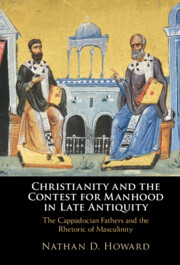 Christianity and the Contest for Manhood in Late Antiquity
Christianity and the Contest for Manhood in Late Antiquity Personifications of Sacred Aretē
Published online by Cambridge University Press: 10 November 2022
Chapter 3 begins by laying out the late-fourth century theological conflict that set the backdrop for the following texts. It then investigates Nyssen’s and Nazianzen’s hagiographic biographies of third-century bishop Gregory Thaumaturgus (c. 210–270), Basil (the Great), Macrina, and Gorgonia; each affiliated with pro-Nicene leadership. In these accounts, the protagonists demonstrate feats of strength and perseverance, modeled on ancient Greek athletes and warriors and biblical heroes; the latter refashioned to accord with characterizations of classical masculinity.The subjects stand out as examples of piety and authority not only for their actions, but also for their appearance.Nyssen and Nazianzen detailed the beauty of each as a testament of their excellence, an example of evaluating the body according to classical Greek norms.As projections of moral superiority and fortitude, these personifications projected Trinitarian supporters as a synthesis of holiness and manhood.By authoring these accounts, Nyssen and Nazianzen enhanced their own capital as theologians associated with saints acquitted through various contests that defended truth.
To save this book to your Kindle, first ensure [email protected] is added to your Approved Personal Document E-mail List under your Personal Document Settings on the Manage Your Content and Devices page of your Amazon account. Then enter the ‘name’ part of your Kindle email address below. Find out more about saving to your Kindle.
Note you can select to save to either the @free.kindle.com or @kindle.com variations. ‘@free.kindle.com’ emails are free but can only be saved to your device when it is connected to wi-fi. ‘@kindle.com’ emails can be delivered even when you are not connected to wi-fi, but note that service fees apply.
Find out more about the Kindle Personal Document Service.
To save content items to your account, please confirm that you agree to abide by our usage policies. If this is the first time you use this feature, you will be asked to authorise Cambridge Core to connect with your account. Find out more about saving content to Dropbox.
To save content items to your account, please confirm that you agree to abide by our usage policies. If this is the first time you use this feature, you will be asked to authorise Cambridge Core to connect with your account. Find out more about saving content to Google Drive.